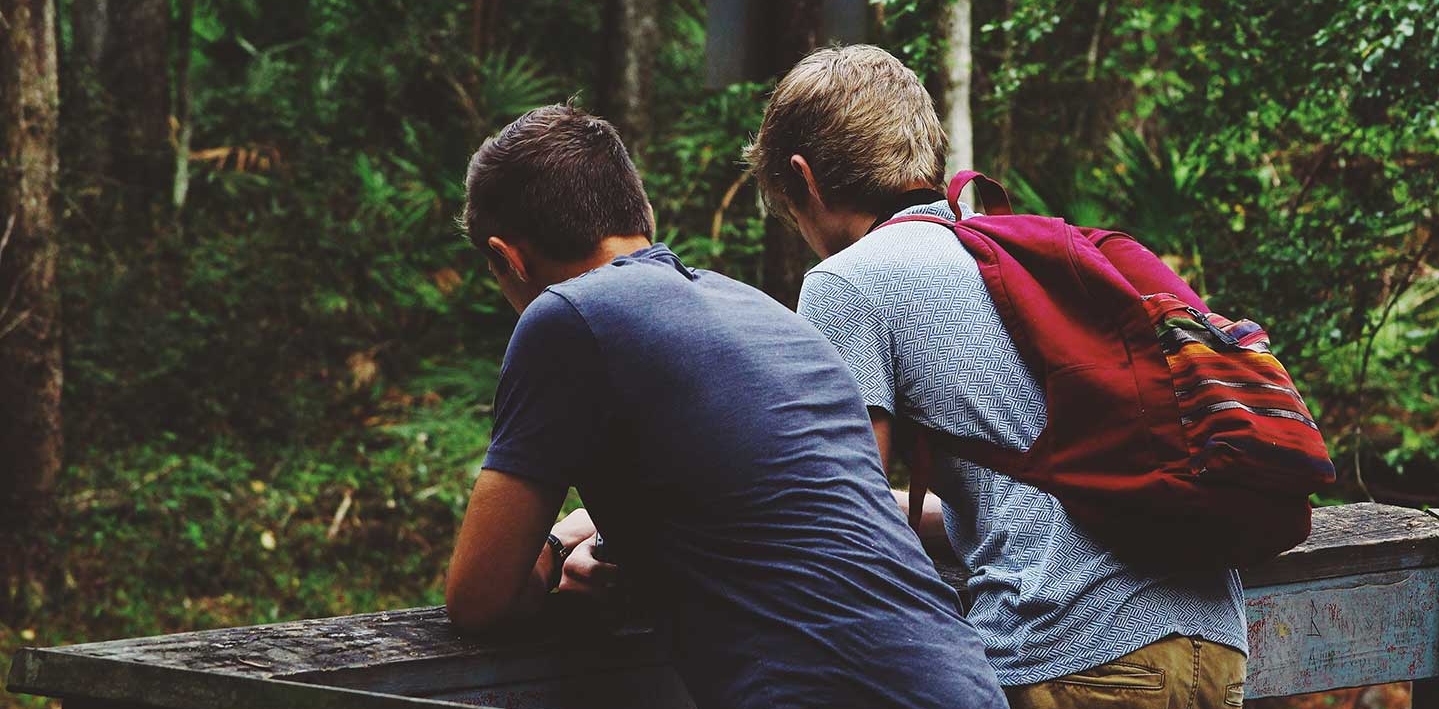
HELP YOURSELF, HELP A FRIEND
ACT — Acknowledge, Care, Tell
- Acknowledge you may have symptoms of depression or suicide. If you think you might be depressed or are thinking about suicide, you need to do something about it! Don’t ignore the warning signs, or think they will just go away. If your friends are reaching out to you and expressing their concern, don’t push them away. Talk to them! Talking openly about your feelings, even if they entail thoughts of suicide, is one of the most helpful things you can do. It is an important first step toward you getting better.
- CARE about yourself. Your mental health is just as important as your physical health. Because of the stigma surrounding mental illness, people might tell you—even well-meaning adults—to “snap out of it” or “just give it time.” Don’t listen to them! Depression is a serious illness that requires treatment from a medical professional. It is not your fault, and nothing you should feel ashamed about. You need to advocate for yourself and get a trusted adult involved.
- TELL a trusted adult. In order to get better you must identify a trusted adult such as a parent, counselor or teacher that you can go talk to. It helps if you have a friend who is able to go with you. If you find yourself alone and your situation is serious, don’t wait until the next day. You can always call 911 or the Suicide and Crisis Lifeline (988) for immediate assistance. You can also text HOME to 741741 (Crisis Text Line). These toll-free lines are staffed 24 hours a day, 7 days a week by trained professionals who can help you.
As a reminder, get a trusted adult involved as soon as possible!
Here is what you can do:
Talk to your parent(s)/guardian(s). Tell them how you feel. You might mention that you’ve been reading up on depression and, based on the symptoms you are having, you think that might be what’s going on with you. Ask your parent(s)/guardian(s) to arrange for you to meet with a counselor or therapist to find out how you can feel better.
If you feel like you’re not getting anywhere with your parent(s)/guardian(s), talk to your school counselor. Counselors are there for you, and their goal is to help you work through this, especially when it is affecting your schoolwork. Your counselor also may be able to help you when it comes to talking to your parent(s)/guardian(s).
If you are not comfortable with or able to talk to a parent/guardian or school counselor, identify another adult in your life who can help. It is critical that you talk to an adult, so if you choose not to talk to a parent, guardian, or school counselor, explore your other options to identify the adult whom you are most comfortable telling. Your friends can help you with this. Remember, it will probably be difficult to have this discussion but a trusted adult can and will help. Some ideas of trusted adults—other than parents/guardians and school counselors—are as follows: Doctor, Religious Leader, Teacher, Coach, Friend’s Parent, Relative (Aunt or Uncle).
When people have depression, it affects their emotions and mood. It twists their way of thinking. Depression can also affect people physically, even causing body aches and pains. Not everyone who is depressed shows it in exactly the same way, though.
Depression affects a person’s thoughts in such a way that he or she doesn’t see that a problem can be overcome. The depression puts a filter on the person’s thinking that distorts reality. That’s why depressed people don’t realize that suicide is a permanent solution to a temporary problem in the same way that other people do. A teen with depression may feel like there’s no other way out of problems, no other escape from emotional pain, or no other way to communicate a desperate unhappiness. But this isn’t true. There is another way.
How can I recognize if I’m depressed or possibly suicidal—or if one of my friends is?
It is normal for a student, who might be facing pressure and stress at school or from friends and family, to feel sadness, anger, or even depression. But sometimes when the sadness doesn’t go away or it turns into hopelessness—or if small problems seem too much to handle—you need to take a closer look. Depression can affect many areas of a person’s life and outlook. Intense feelings of sadness, emotional pain, or irritability may ultimately lead to suicidal thoughts.
You may have heard that people who talk about suicide won’t actually go through with it. That’s not true; in fact, it is one of the leading myths about suicide. The truth is, almost everyone who dies by suicide has given some clue or warning. Do not ignore suicide threats. Statements like “You’ll be sorry when I’m dead,” or “I can’t see any way out”–no matter how casually or jokingly said–may indicate serious suicidal feelings.
What are some of the warning signs of someone at risk for suicide?
- Preoccupation with death: talking, reading or writing about suicide or death
- Making indirect statements about death or suicide, such as “My family would be better off without me,” or “What’s the point of living?”
- Conveying feelings of worthlessness or hopelessness
- Making direct statements about death or suicide, such as “I’m going to kill myself” or “I wish I were dead”
- Putting one’s affairs in order (e.g., visiting people to say good-bye, giving away possessions)
- Engaging in risky behaviors (e.g., purposefully putting oneself in danger, increased use of alcohol and/or drugs)
- Neglecting one’s appearance and hygiene
- Obtaining access to guns or other means of hurting oneself
- Withdrawal from friends and family and/or dropping out of school, athletic or social activities
- Major change in eating and/or sleeping habits
- Sudden or dramatic mood changes
A specific event, stress, or crisis—like sexual abuse, bullying, break-up or a death in the family—can trigger suicidal behavior in someone who is already feeling depressed and showing the warning signs listed above.
REMEMBER: Not everyone recognizes depression when it happens to someone they know or love.
Depression can be difficult to understand. Little or no energy, a key sign of depression, is often mistaken for laziness, lack of motivation or an unwillingness to try. On top of this, depression does not always manifest as “sadness.” In teenagers, it often looks like anger or irritability. Some people believe, wrongly, that depression is just an attitude or a mood that someone can just shake off. It’s not that easy.
Sometimes, even people who are depressed don’t take their condition seriously enough. They might feel they are weak in some way, or that they are disappointing others because they are depressed. Not only is this attitude incorrect, it can be harmful if it causes people to hide their depression and avoid getting help. Occasionally, when depression causes physical symptoms (like headaches or other stress-related problems) a person may see a doctor. Though well-meaning, sometimes even a doctor may not recognize depression in a patient, particularly if the physical symptoms are the primary focus.
Here are some of the things people notice with depression:
- Negative feelings and mood. Depression involves feeling a negative, low mood for weeks or more. Someone with depression might feel unusually sad, discouraged, or defeated. He or she may feel hopeless, helpless, or alone. Some people feel guilty, unworthy, rejected, or unloved. Any or all of these emotions can be part of a depressed mood. Depression doesn’t always cause people to feel mostly sad, though. For some people, especially teenagers, depression manifests as irritability, anger and/or frustration.
- Negative thinking. When somebody has depression, it can cloud everything. The world looks bleak, and the person’s thoughts reflect that hopelessness and helplessness. This can make a person think things will never get better, that problems are too big to solve, that nothing can improve the situation, or that nothing matters. People with depression tend to have negative and self-critical thoughts. They may believe they are worthless and unlovable — even though that’s not true. Depression can cause someone to think that life isn’t worth living. That can lead people with depression to think about harming themselves or about ending their own life.
- Low energy and motivation. People with depression may feel tired, drained, or exhausted. They might even move more slowly or take longer to do things. It can feel as if everything requires more effort. People who feel this way might have trouble motivating themselves to do or care about anything.
- Depression can make it hard to concentrate and focus. It might be hard to complete schoolwork, pay attention in class, remember lessons, or stay focused on what others say.
- Physical symptoms. People can feel depression in their bodies as well as their minds. Some people have an upset stomach or loss of appetite. Some might gain or lose weight. Some people notice headaches and sleeping problems when they’re depressed.
- Social withdrawing. Because of feelings of sadness and low energy, people with depression may pull away from friends and family or from activities they once enjoyed. This usually makes them feel more lonely and isolated. That can make the depression and negative thinking worse.
Taken from kidshealth.org
WHY DO TEENS KILL THEMSELVES?
Why do teens try to kill themselves?
Most teens interviewed after making a suicide attempt say that they did it because they were “trying to escape” from a situation that seemed impossible to deal with or “get relief” from bad thoughts or feelings. Some people who end their lives or attempt suicide might be trying to escape feelings of rejection, hurt, or loss. Others might feel angry, ashamed, or guilty about an event or circumstance in their lives. Some people may be worried about disappointing friends or family members. And some may feel unwanted, unloved, victimized, or like they’re a burden to others. We all feel overwhelmed at times by difficult emotions or situations. So why does one person try suicide when another person in the same tough situation does not? What makes some people more resilient (better able to deal with life’s setbacks and difficulties) than others? The answer to those questions lies in the fact that most people who complete or attempt suicide have depression.
Depression is more than just being “sad”
It is normal to feel sad, down or discouraged sometimes; these are natural human emotions that we all experience. We may feel sad over an argument with a friend or parent, a breakup, or a friend moving away. We might be disappointed about doing poorly on a test or getting cut from a sports team. The death of someone close can lead to a specific kind of sadness — grief. Most of the time, people manage to deal with these feelings and get past them with a little time and care.
Depression, however, is more than occasionally feeling blue, sad, or down in the dumps. Depression is a serious illness that requires both diagnosis and treatment from a trained medical professional.
When people have depression, it affects their emotions and mood. It twists their way of thinking. Depression can also affect people physically, even causing body aches and pains. Not everyone who is depressed, however, shows it in exactly the same way.
Depression affects a person’s thoughts in such a way that he or she doesn’t see that a problem can be overcome. The depression puts a filter on the person’s thinking that distorts reality, and may therefore see suicide as the only solution to their problems. But this isn’t true. There is another way.
Sometimes people who feel suicidal may not even realize they are depressed. They’re unaware that it is the depression, not the situation, that’s influencing them to see things in a “there’s no way out,” “it will never get better,” “there’s nothing I can do” kind of way. When depression lifts because someone gets the proper therapy or treatment, the distorted thinking is cleared. The person can find pleasure, energy, and hope again. But while someone is seriously depressed, suicidal thinking is a real concern.
Substance Abuse
Teens with alcohol and drug problems are also more at risk for suicidal thinking and behavior. Alcohol and some drugs have depressive effects on the brain. Misuse of these substances can bring on serious depression. That’s especially true for some teens who already have a tendency for depression because of their biology, family history, or other life stressors. Many people who are depressed turn to alcohol or drugs as an escape, but they may not realize that the depressive effects alcohol and drugs have on the brain can actually intensify depression in the long run. In addition to their depressive effects, alcohol and drugs alter a person’s judgment. They interfere with the ability to assess risk, make good choices, and think of solutions to problems. Many suicide attempts occur when someone is under the influence of alcohol or drugs. This doesn’t mean that everyone who is depressed or who has an alcohol or drug problem will try to kill themselves. But these conditions, especially both together, increase a person’s risk for suicide.
Other risk factors for suicide in teens include:
- Identifying as LGBTQ+ (Lesbian, Gay, Bisexual, Transgender or Queer/Questioning)
- Someone who has been raped or sexually assaulted
- Someone who is a victim of bullying for an extended period of time
Suicide Is Not Always Planned
Sometimes a depressed person plans a suicide in advance. Many times, though, suicide attempts happen impulsively, in a moment of desperation. A situation like a breakup, a big fight with a parent, or being victimized in any way can exacerbate feelings of hopelessness and trigger a suicide attempt. Situations like these, on top of an existing depression, often act as “the final straw.” Some people who attempt suicide intend to die, while others aren’t completely sure they want to die. They may view suicide as the only way to end their pain. Sadly, many people who really didn’t mean to kill themselves end up dead or critically ill.
What if This Is You?
If you have been thinking about suicide, get help now. Depression is powerful. You can’t wait and hope that your mood might improve. When a person has been feeling down for a long time, it’s hard to step back and be objective. Talk to someone you trust as soon as you can. If you can’t talk to a parent, talk to a coach, a relative, a school counselor, a religious leader, or a teacher. Call the Suicide and Crisis Lifeline (988) or your local emergency number (911). These toll-free lines are staffed 24 hours a day, 7 days a week by trained professionals.
FIVE WAYS TO FIGHT DEPRESSION
If you feel depressed, it’s best to do something about it. Depression doesn’t just go away on its own. In addition to getting help from a doctor or therapist, here are five things you can do to feel better:
1. Exercise. Take a 15- to 30-minute brisk walk every day — or dance, jog, or bike if you prefer. People who are depressed may not feel much like being active. But make yourself do it anyway (ask a friend to exercise with you if you need to be motivated). Once you get in the exercise habit, it won’t take long to notice a difference in your mood.
2. Nurture yourself with good nutrition. Depression can affect appetite. One person may not feel like eating at all, while another might overeat. If depression has affected your eating, you’ll need to be extra mindful of getting the right nourishment. Proper nutrition can influence a person’s mood and energy. So eat plenty of fruits and vegetables and get regular meals (even if you don’t feel hungry, try to eat something light, like a piece of fruit, to keep you going).
3. Identify troubles, but don’t dwell on them. Try to identify any situations that have contributed to your depression. When you know what’s got you feeling blue and why, talk about it with a caring friend. Talking is a way to release the feelings and to receive some understanding. If there’s no one to tell, pouring your heart out in a journal works well. Once you air out these thoughts and feelings, turn your attention to something positive. Take action to solve problems. Ask for help if you need it. Feeling connected to friends and family can help relieve depression.
4. Express yourself. With depression, a person’s creativity and sense of fun may seem blocked. Exercise your imagination (painting, drawing, doodling, sewing, writing, dancing, composing music, etc.) and you not only get those creative juices flowing, you also loosen up some positive emotions. Take time to play with a friend or a pet, or do something fun for yourself. Find something to laugh about, a funny movie, perhaps. Laughter helps lighten your mood.
5. Look on the bright side. Depression affects a person’s thoughts, making everything seem dismal, negative, and hopeless. If depression has you noticing only the negative, make an effort to notice the good things in life. Try to notice one thing, then try to think of one more. Consider your strengths, gifts, or blessings. Most of all, don’t forget to be patient with yourself; depression takes time to heal.
Adapted from www.kidshealth.org



